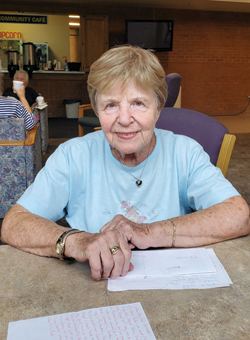World War II refugee recounts her journey to America
by Laura Bednar
When faced with the choice of staying in the only home she’s ever known or fleeing the country to escape death, Independence resident Ivana Pieronek and her family left Slovenia and came to America during World War II.
A group known as the Slovene Partisans or formally, National Liberation Army and Partisan Detachments of Slovenia, was an anti-Nazi resistance movement during the war. Pieronek said her family discovered it was a communist group that was killing their friends.
Pieronek’s father escaped membership in the Partisans, which put the family in a dangerous position. Her mother said the family decided to leave the country, but according to Pieronek, “My father said, ‘I don’t want to leave; I didn’t do harm to anyone.’” The family chose to leave after drawing straws.
Her family had a farm in Kamnik, Slovenia, near a forest, where her father used to chop wood for his carpentry work.
“We left everything,” Pieronek said, including one of her sisters. No one could own property unless there were three people living in a residence. Pieronek’s sister stayed on the farm with her aunt and grandmother. Her other two sisters, younger brother and parents left Slovenia in 1939.
“I didn’t realize how hard it must have been for my parents to leave until I got older,” she said.
Pieronek’s family were considered political refugees due to their Partisan opposition and moved to the city of Mengeš for protection by the Slovene Home Guard, an anti-Partisan military group. They stayed there for one year on their way to Austria. Refugees escaped into Austria by hiking over mountains or traveling by tunnel through the mountains.
Pieronek’s family walked through the tunnels in complete darkness for eight hours until they reached the Austrian city of Celonec, where they stayed in an open field for six weeks, with only a tent made of sheets for shelter.
The family later settled in Spettel, staying until 1949, including four years in a camp with 10,000 others. Each family had one room in the camp that previously housed Austrian soldiers. Pieronek’s family had uncles in the United States who sent bags of flour for the family to trade for other goods.
They waited for a week in the city of Bremerhaven for a boat to take them to America. Pieronek’s family landed in Boston then came to Cleveland on May 16, 1949. They rented a home until building their own in 1952.
Pieronek said after coming from a mountainous country, “I was disappointed [America] was all flat.”
Her father continued working as a carpenter, and her mother cleaned a factory at night. Her mother learned English by watching television and baseball games.
Pieronek started school in September of ’49, not knowing a word of English. In the morning, she would attend first grade to learn to read; in the afternoon she would move to sixth grade, her appropriate academic level. Pieronek recalled saying, “I no can,” when becoming frustrated over learning English.
She later attended then-Villa Angela High School in Cleveland, finishing in three years. She went to St. Alexis nursing school for a three-year program and worked at St. Alexis Hospital, which became St. Michael Hospital before it was purchased by University Hospitals.
Pieronek worked at St. Alexis part time for 39 years. In her early days at the hospital she met her husband, Frank, long distance. She was treating a patient whose brother was in the Navy during the Korean War.
At the time, many nurses wrote to soldiers, and Pieronek began writing to her patient’s brother, Frank, every few days. “He proposed to me in a letter before I even met him,” she said.
Frank eventually returned home, but the couple didn’t marry for almost a year. She was 21 and he was 23. They have been married for 64 years and have six children, eight grandchildren and six great-grandchildren. Two of Pieronek’s daughters became nurses, as did two of her grandsons, who both married nurses.
Pieronek became a U.S. citizen five years after arriving in Boston. She lived in Middleburg Heights for eight years, Seven Hills for 26 years and now Independence for 32 years. Her sister stayed in Slovenia, even after being invited to join the family in America. At the time, she was in a relationship but now regrets not coming to the U.S., according to Pieronek.
Pieronek said her situation was similar to those caught in the middle of the war in Ukraine. “It’s not that you want to rebel,’’ she said. “You either leave or you die, and many can’t walk the distance.” ∞

